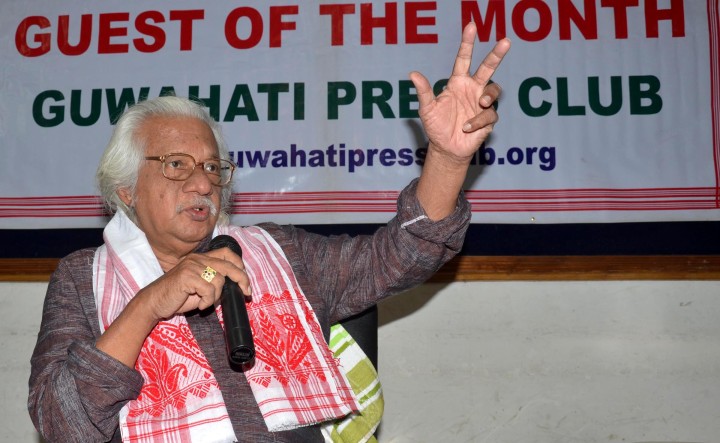He may oppose the censorship to movies, but remains concerned about the obscenity and violence in the alternate media space. Being a master filmmaker of the country, Adoor Gopalakrishnan maintained his stand against the film censorship as the Padma Vibhushan awardee argues that the audience in a democratic society like India should decide what to watch and what not.
Gopalakrishnan, who came to Guwahati to receive the coveted Bishwaratna Dr Bhupen Hazarika International Solidarity Award, attended the ‘Guest of the Month’ programme of Guwahati Press Club on 30 March 2015.
Honored with Dada Saheb Phalke award, the Malayalam film director also questioned that if the television channels are not censored, why the movies are being targeted. However, the genius film personality continues to be concerned about the free-flow of vulgarities through the online outlets (alternate media).
“I do not support the practice of censorship. The viewers should decide what to watch and what not. India is a democratic country/society and such practices should be avoided in our country,” asserted the Malayalam film maker. He however expressed concern that many regional films of south India contain excessive violence and they are simply copying the Hollywood trend.
One of the finest film directors of India, Gopalakrishnan advises the parents to discourage their children from viewing such violent movies. He pointed out that the American society, which the Hollywood movies imitate, may be violent, but Indian society as a whole remains as non-violent.
“We still follow moral values in our social life. The Indian society, irrespective of our diversity, would never be violent,” asserted Gopalakrishnan, who has made eleven feature films in Malayalam language including ‘Swayamvaram’, ‘Elippathayam’, ‘Mukhamukham’, ‘Anantaram’, ‘Mathilukal’ etc and all of those creations brought laurels to him and Indian film fraternity. He also scripted all of his of movies, besides 30 short movies & documentaries. His last feature film was ‘Oru Pennum Randaanum’, which was released in 2008 and presently Gopalakrishnan is busy preparing for his next venture. Gopalakrishnan also batted for regional film-world in northeast India and argued that the local film industry should be supported by the respective State governments.
“Assamese cinema needs support from audience as well as the government. The authority should provide adequate financial support to the regional film fraternity and also initiate for good infrastructure to showcase the regional cinemas,” added Gopalakrishnan. On the previous evening Gopalakrishnan was conferred the Bhupen Hazarika award, which was sponsored by Asom Sahitya Sabha, by the State chief minister Tarun Gogoi. The chief minister termed Bhupenda, as millions of his fans like to call the genius musician, a great humanist and revolutionary ever born in Assam.
“A cultural doyen, Bhupen Hazarika forged a synergy among all geographical territories in the country and brought about unity in the country,” said Gogoi adding that he witnessed ‘lot of similarities between Bhupen Hazarika and Adoor Gopalakrishnan’ as both them acted as bridge between Assam and Kerala, though both the States are geographically far off.
Gopalakrishnan became the second recipient of this biennial award, as the first awardee was Bangladesh’s well-known researcher-danseuse Lubna Marium, who received the award consisting of a citation, a memento, an Assamese traditional silk shawl and cash reward of rupees five lakh, in 2013.
Acknowledging the gesture of Asom Sahitya Sabha for offering the honour in the name of Bhupen Hazarika, Gopalakrishnan also mentioned various similarities possessed by Kerala and Assam including its green landscapes, abundant rains, growing vector-borne diseases and also the lifestyle of the habitants. He also pointed out that both the States are geographically apart, but the people are emotionally very much close.










